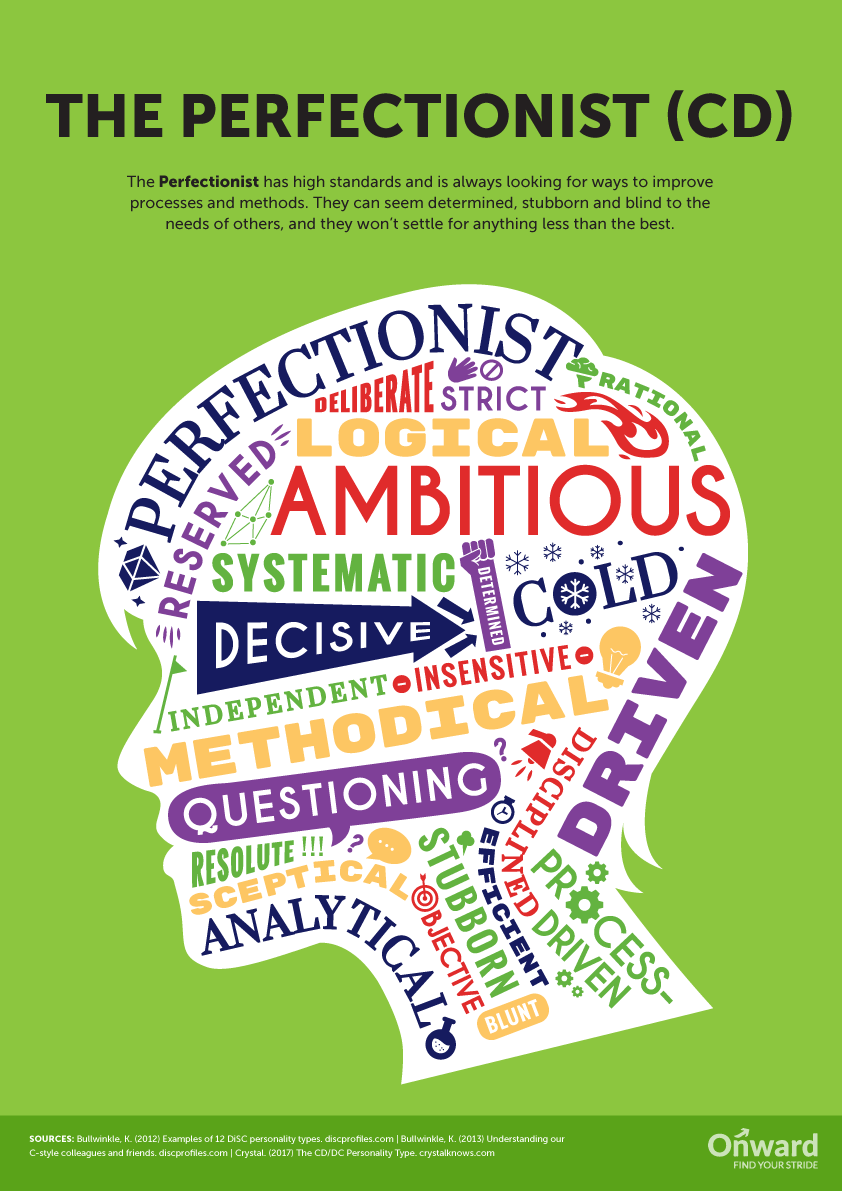
How to Recognize Which DISC Personality Type You Are
Are you familiar with DISC profiles?
They make up the personality analysis system developed nearly a century ago by William Moulton Marston, the psychologist and – wait for it – inventor of Wonder Woman. And like Marston’s comic book heroine, they’re just as relevant today as the day they were first inked.
Marston’s DISC system began with the four compass points of personality that give the profiles their name: dominance (D), influence (i), steadiness (S), and conscientiousness (C). Marston observed that you can broadly define yourself through one or two of these traits that fit you most closely.
If two adjacent traits fit you closely, you can be more specific by identifying which of those traits manifests foremost in your behavior.
Altogether, that gives 12 combinations. Figuring out which of the 12 you are, and where your colleagues fit into the equation, can make working together a heck of a lot easier. Here's a look at how to identify yourself and those around you – and what to do with the results.
The Challenger (DC)
The Challenger type does not mess about. She is driven, accomplished, and assertive – though she may also be perceived as insensitive, impersonal, or aloof. That’s because she is most comfortable in a dominant position, either leading the team or being an influential voice.
This confidence combined with her creativity make for a useful ally. Too many Challengers in a team can lead to trouble, but that’s why it’s handy to identify the types around you and to attempt to balance these personalities accordingly. If you yourself are a Challenger, that might mean learning to slow down and listen to the quieter voices around you.
Challengers can also benefit from trying to value intangible results and long-term investments, even if they’re not as satisfying as the instant pay-off of a risky decision.
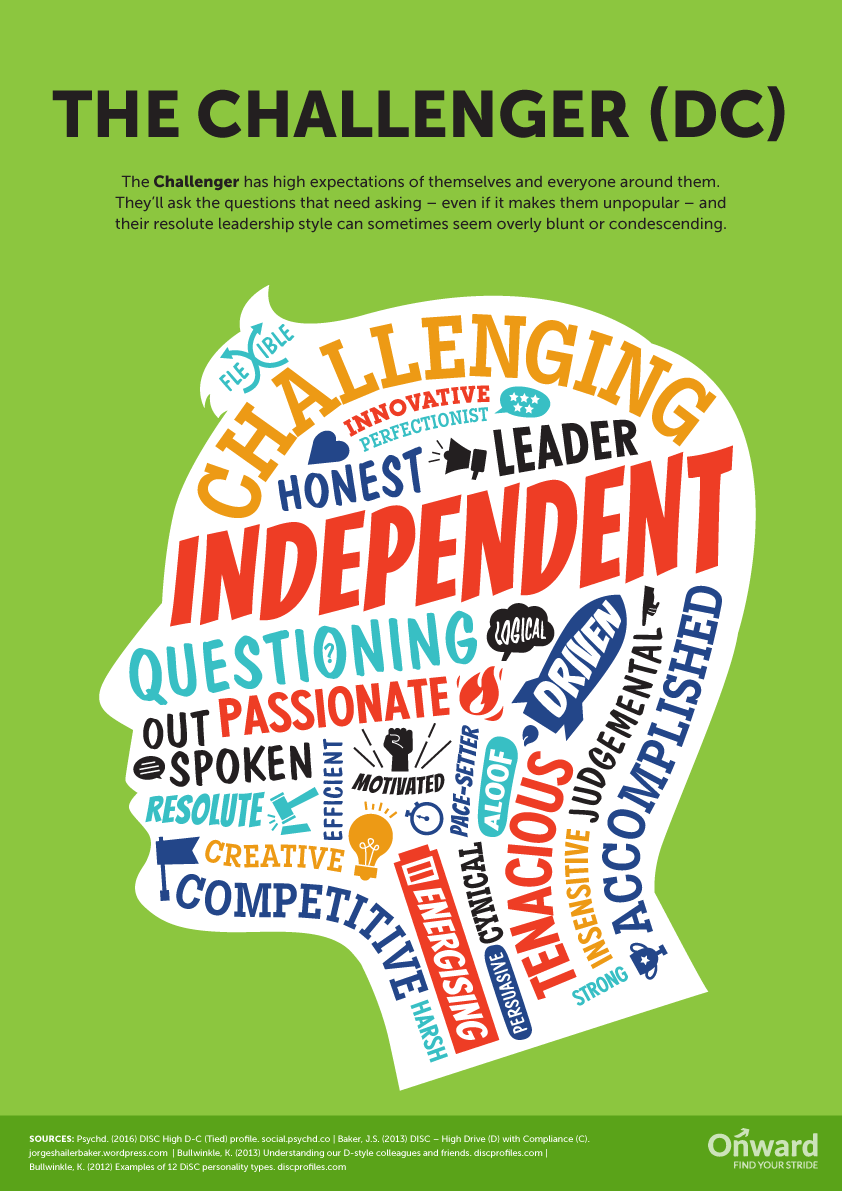
The Winner (D)
First cousin to the Challenger, the Winner is a dominant type who makes decisions from the top.
A focused, inspirational character, she may be an out-and-out leader who demands results rather than spending time working on the nuts-and-bolts of daily work. She’ll look at the research and ideas that her crew have generated (working in an environment that she has shaped) and make the best decisions on how to proceed.
Like the Challenger, if this is you, you may benefit from slowing down from time to time to get to know the personalities around you, rather than driving forward on assumptions and raw energy alone.
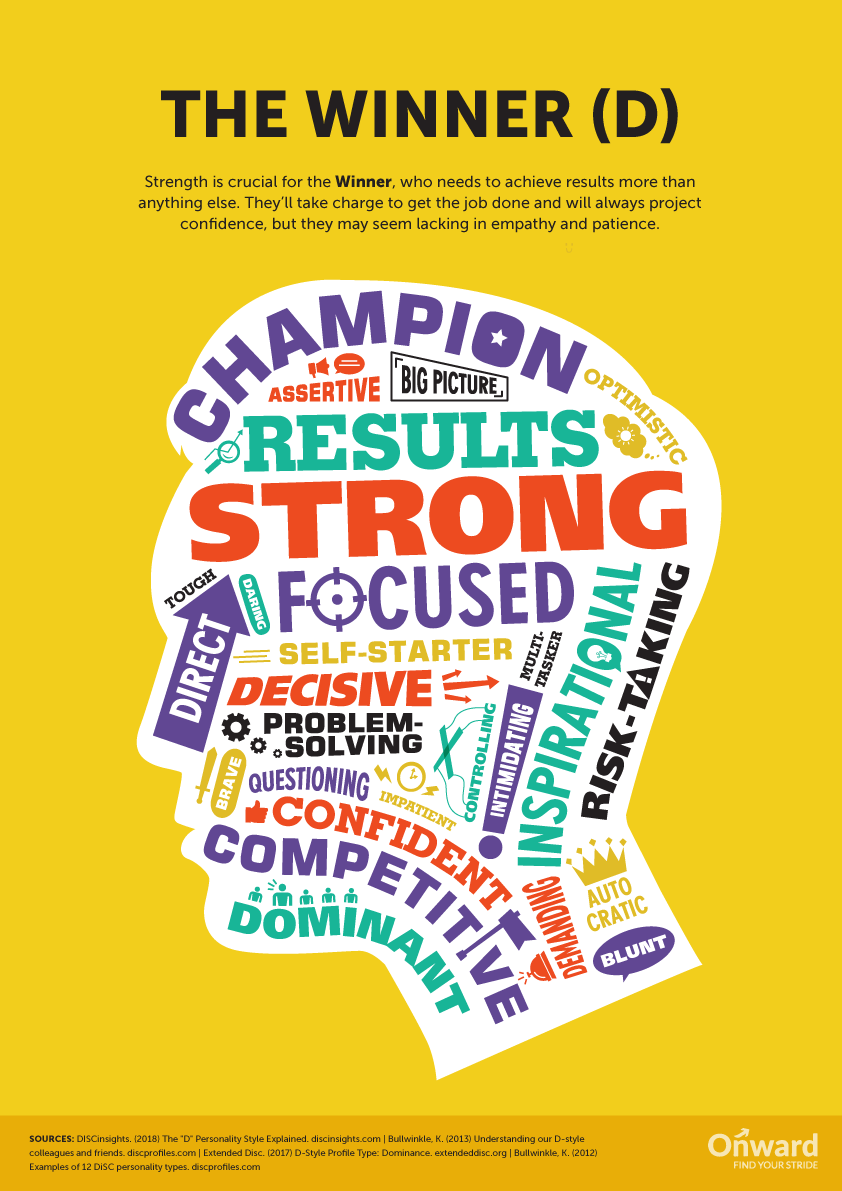
The Seeker (Di)
The Seeker is a pioneer. She is happy to take the difficult route to success if it means creating more profitable processes and ideas. She gets frustrated resting on her laurels and will egg her colleagues on to innovate fresh ideas of working.
She may work more closely with her colleagues than the Winner or Challenger do, but it’s still worth being brief, bold, and to the point when communicating with a Seeker.
But if you fit into this personality category, a bit of self-awareness is needed to keep yourself on track. Seekers have a tendency to innovate for the sake of innovation, and may love an idea for its novelty rather than its true worth. Be careful not to trample over the feelings and needs of your colleague as you seek out ways to maximize your business’s potential, because people are most important of all.
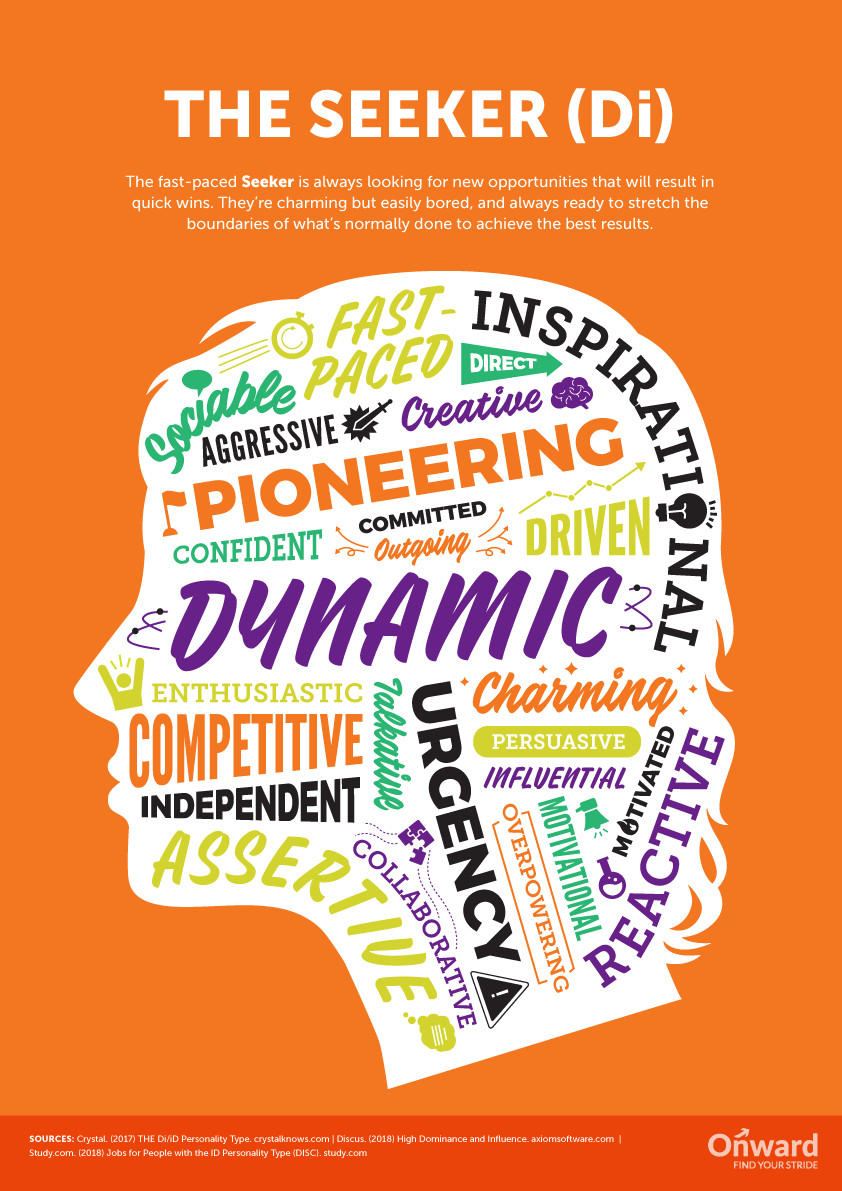
The Risk Taker (iD)
The Risk-Taker, too, is about new ideas and bold leaps ahead. She may be less likely to seek out a position of authority, which means she’ll be exploring those ideas among her hierarchic equals on the ground level.
If you have a Risk-Taker for a colleague, try to figure out how best to balance the workload between you. It may be most productive for them to lead on bold new tasks while you manage the ongoing day-to-day stuff.
And if you’re a Risk-Taker yourself, remember you’re working as part of a team. You may find yourself frustrated by the slower pace of your colleagues, but the way they work has its advantages too!
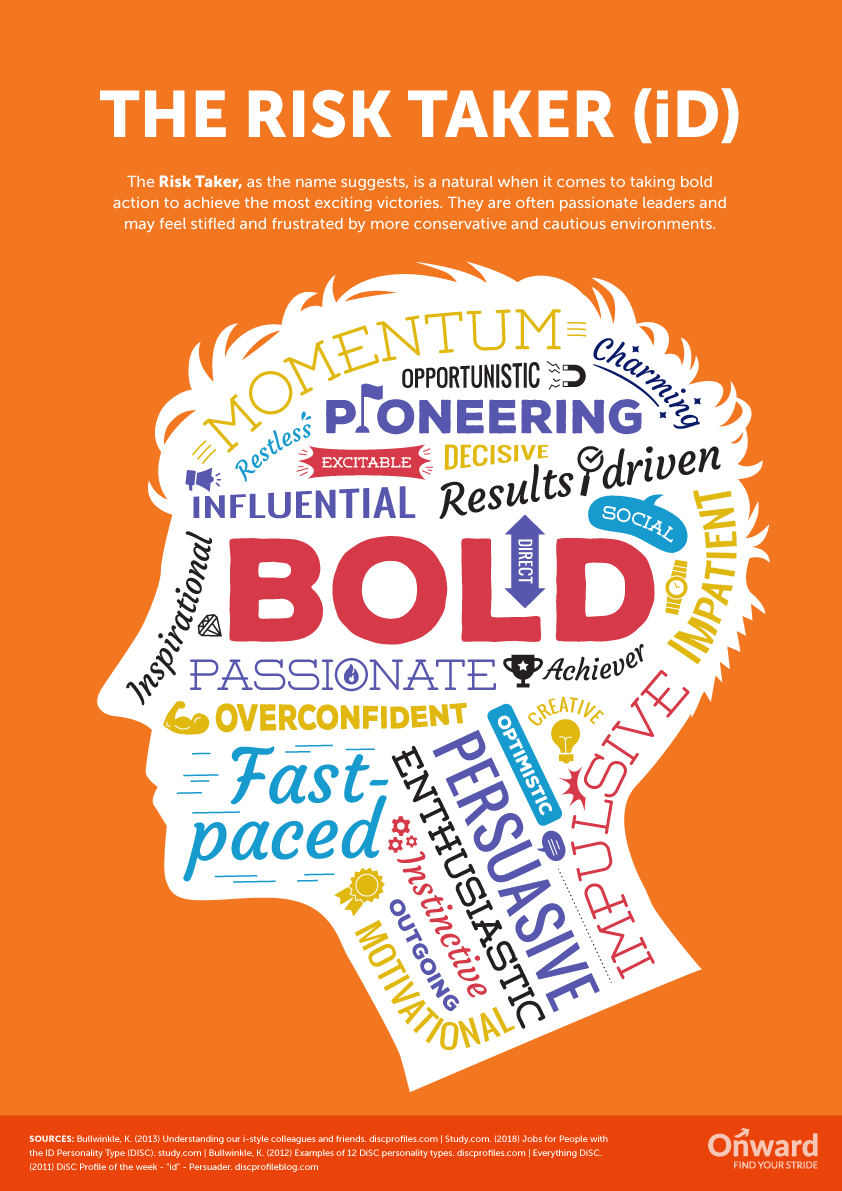
The Enthusiast (i)
Everyone loves an Enthusiast, at least once the early morning fog has lifted!
She is an ExtrAvert whose passion is contagious and who can re-energize flagging morale in a tired meeting room. That over-active mind is great at solving problems and will power a team through dark moments back into the light.
However, her charm and enthusiasm may come at the expense of taking the time to listen closely to others. If you recognize yourself in the Enthusiast, be careful to think through what your colleagues are trying to express before you take their idea and run with it.
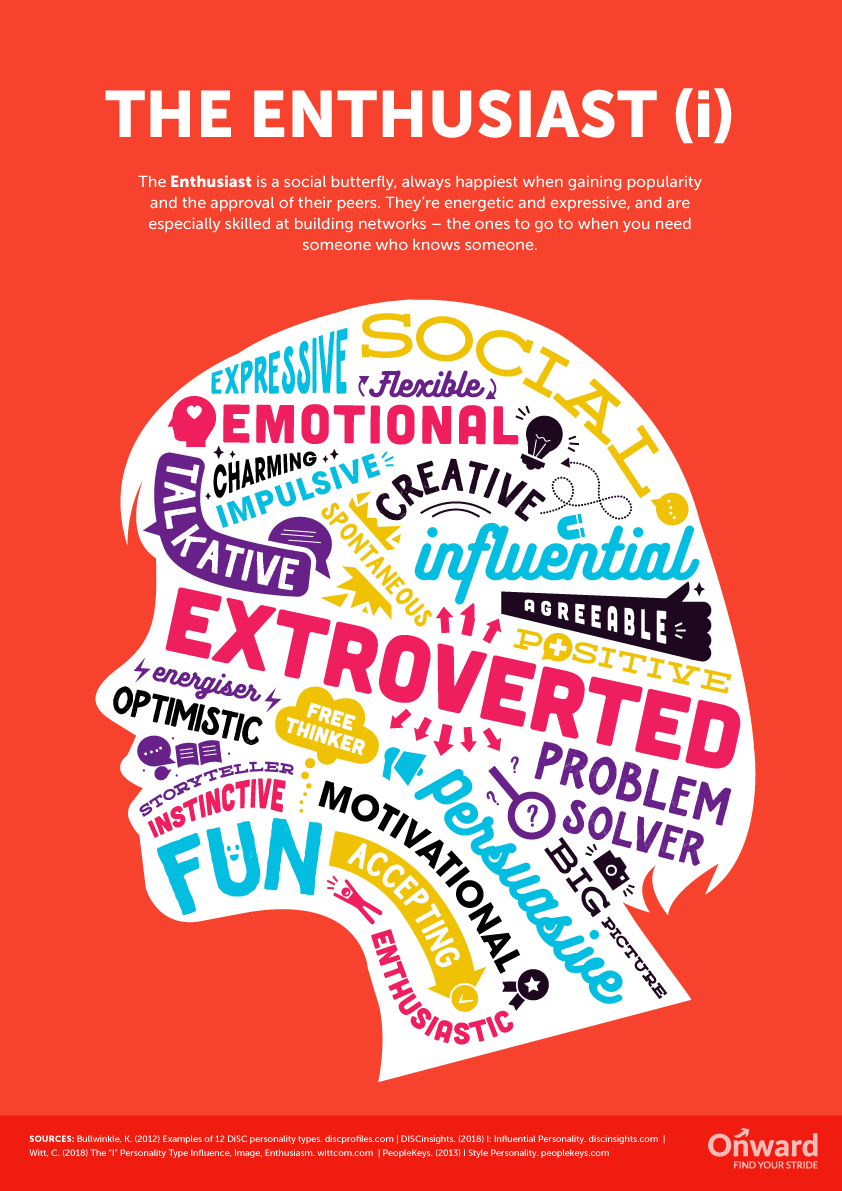
The Buddy (iS)
The Buddy, on the other hand, is always ready to listen and empathize with her colleagues. Her enthusiasm manifests through the emotional and professional support she offers others. She’s confident, perceptive, and approachable, and works at the social hub of the team.
However, the Buddy is such a kindhearted soul that her own work may take a back seat next to the support she offers others. If you reckon you’re a Buddy, great – you’re a lovely person: just remember that your team will also benefit if you’re a bit more assertive about prioritizing your own workload.
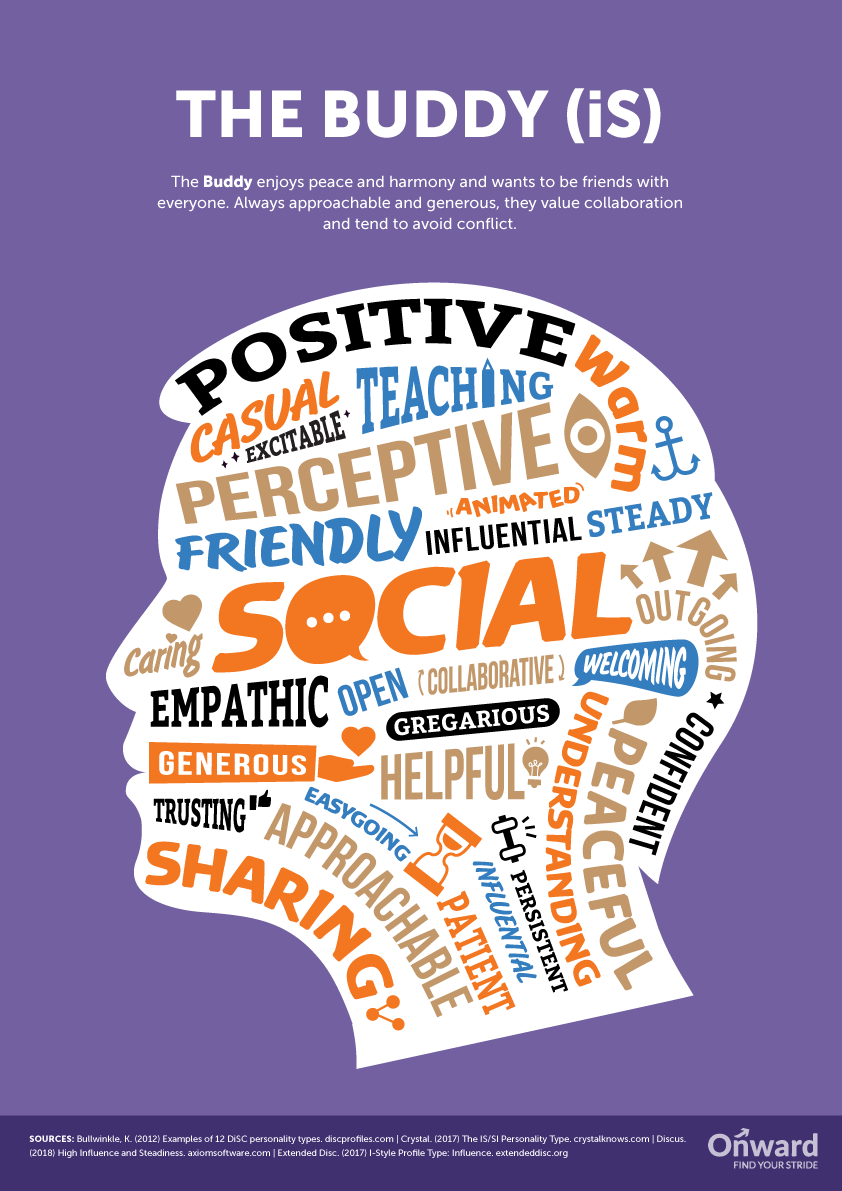
The Collaborator (Si)
The Collaborator brings people together. Her sense of empathy and her listening skills make her ideally placed to assemble teams and work units that will function well together and become more than the sum of their parts.
Like the Buddy, if you’re a Collaborator you can be depended on to look out for others and ensure that credit is properly assigned for your team’s successes.
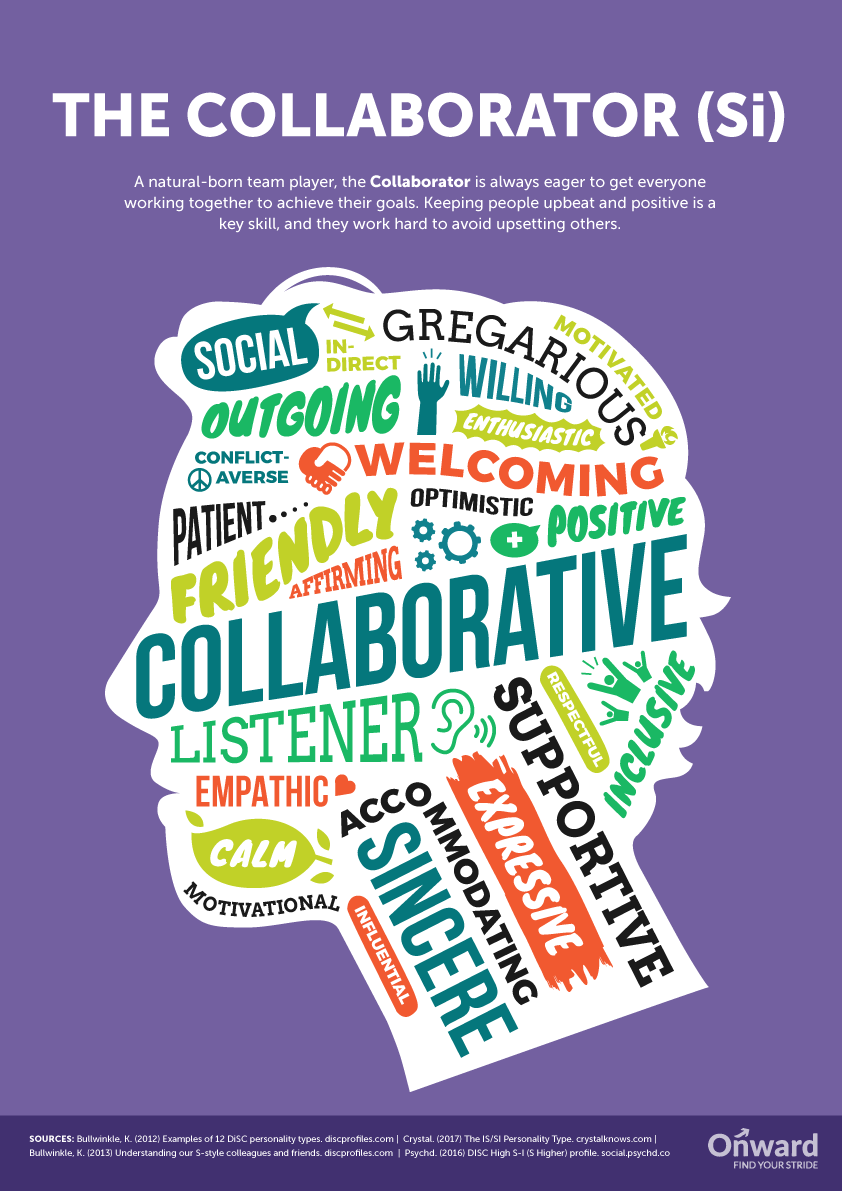
The Peacekeeper (S)
If you belong at the Steady point of the DISC compass, you can be relied upon to anchor your teammates and bridge the gap between management and the workforce.
You know the job inside out. You’re considerate, peaceful, and careful, all of which are essential elements in a dynamic team. Perhaps you find yourself unnerved by change or unwilling to take risks – this makes it extra valuable for you to learn and understand the other personality types, so you can develop trust in those who may drive the business in directions for which you don’t feel 100 percent ready.
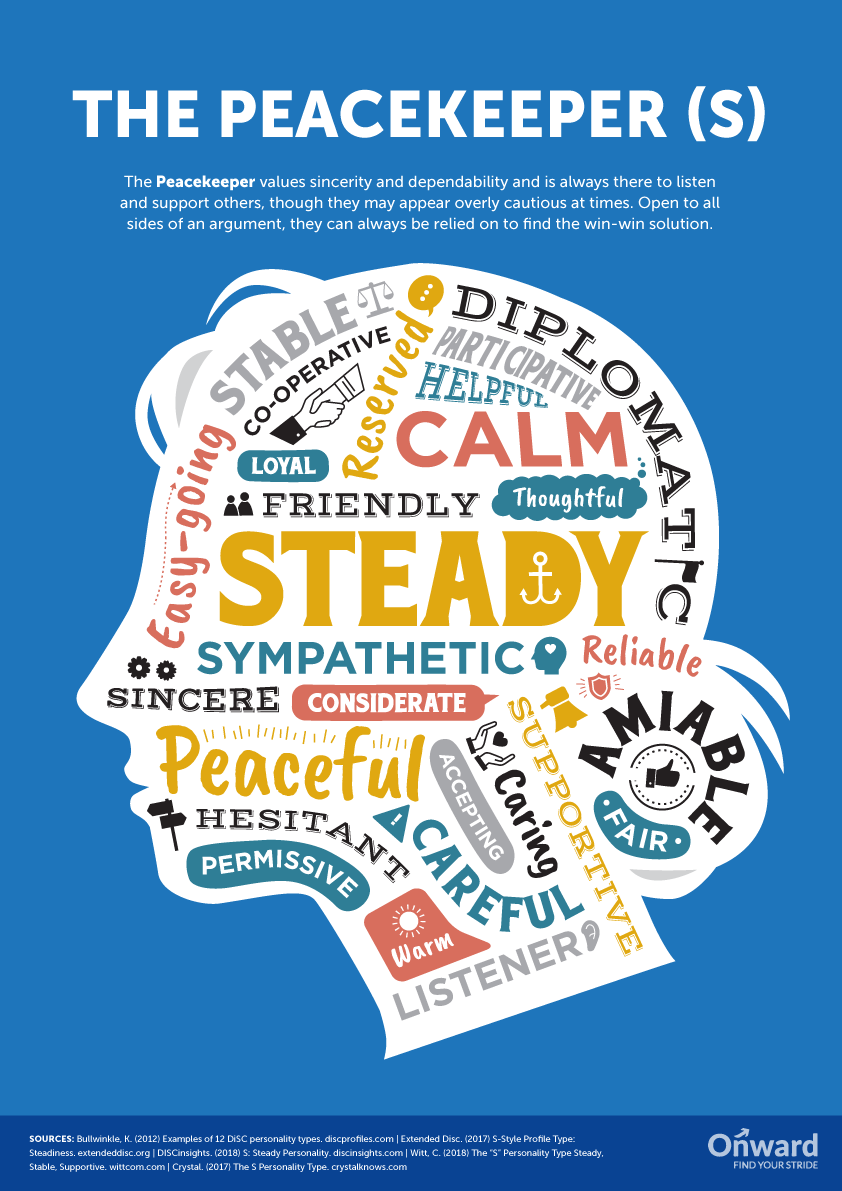
The Technician (SC)
The Technician is not necessarily good with technology, although she may be – rather, she is logical and understands the ins and outs of the business itself.
This may mean she is content to quietly get on with her work without interacting so much with her colleagues or pushing hard for new developments. If this is you, you will be valued for the determined way in which you get your work done – but try becoming more engaged with your colleagues and with new ideas to gain a fuller sense of accomplishment.
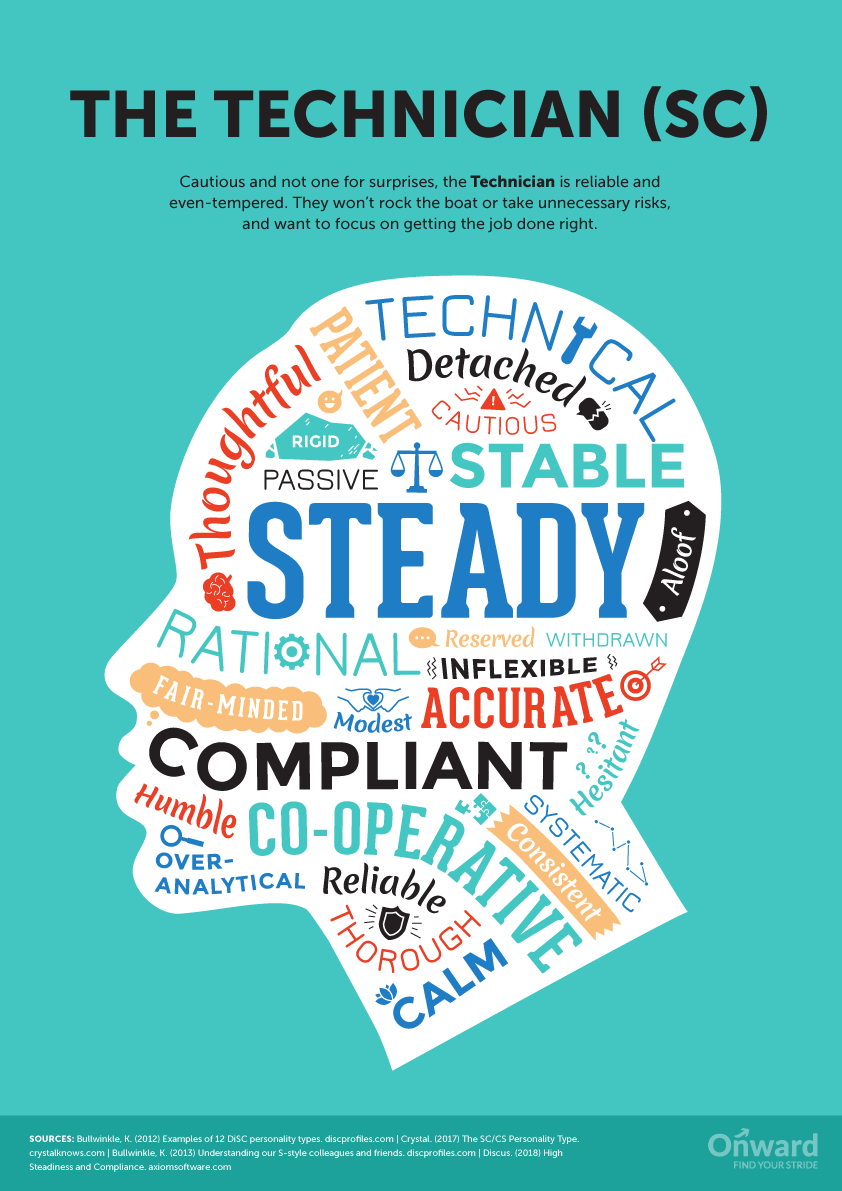
The Bedrock (CS)
The Bedrock is a reliable soul who avoids conflict but doesn’t shirk responsibility.
When you’re dealing with this type, it can be useful to lead with questions and details to get her involved with what’s going on and ensure she’s on the same page.
She’s a good worker, but her withdrawn nature means she might get left behind if more assertive personality types don’t take the trouble to involve her.
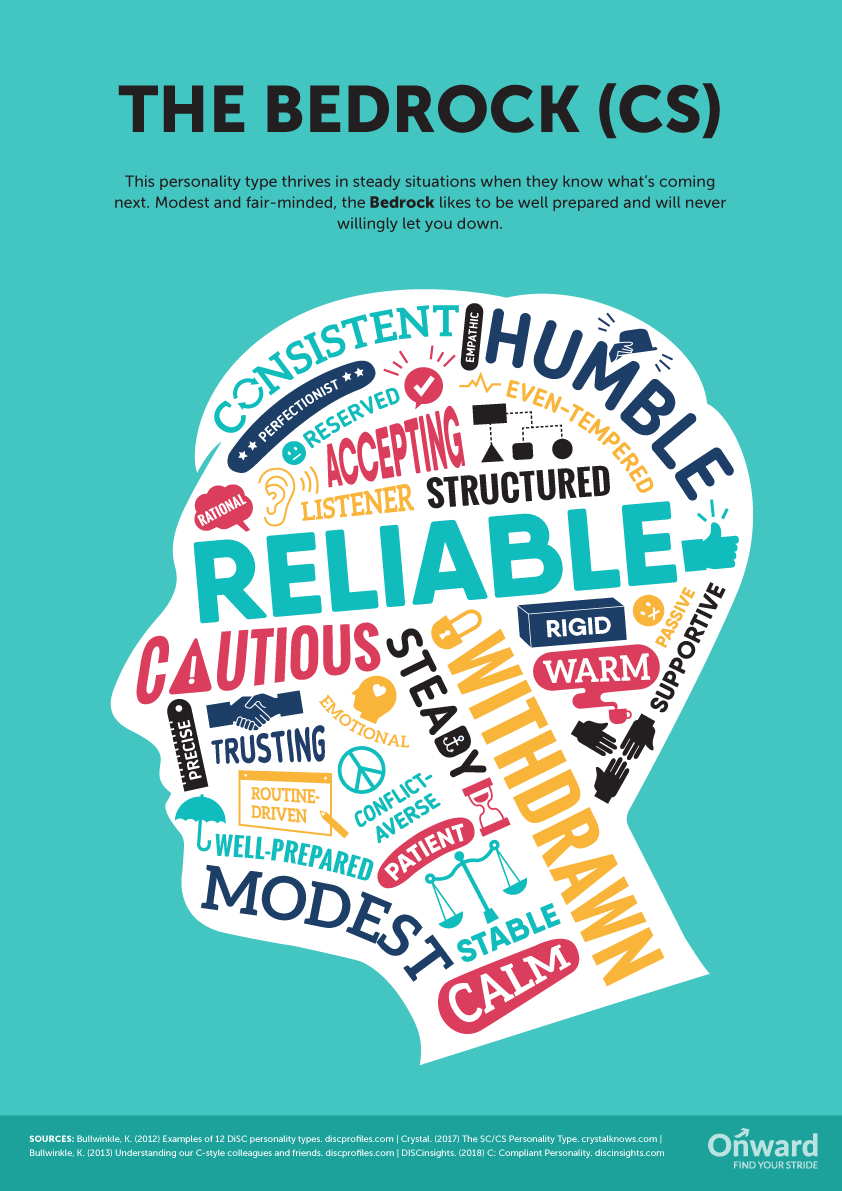
The Analyst (C)
If you’re an analyst, you’ll know how easy it is to get seduced by the details. You may find yourself losing track of time and your surroundings on the path to perfectionism!
Your focus and insight are an asset to the team, but be careful to check in with the other guys so you don’t end up chasing white rabbits while the rest of the company is going in another direction.
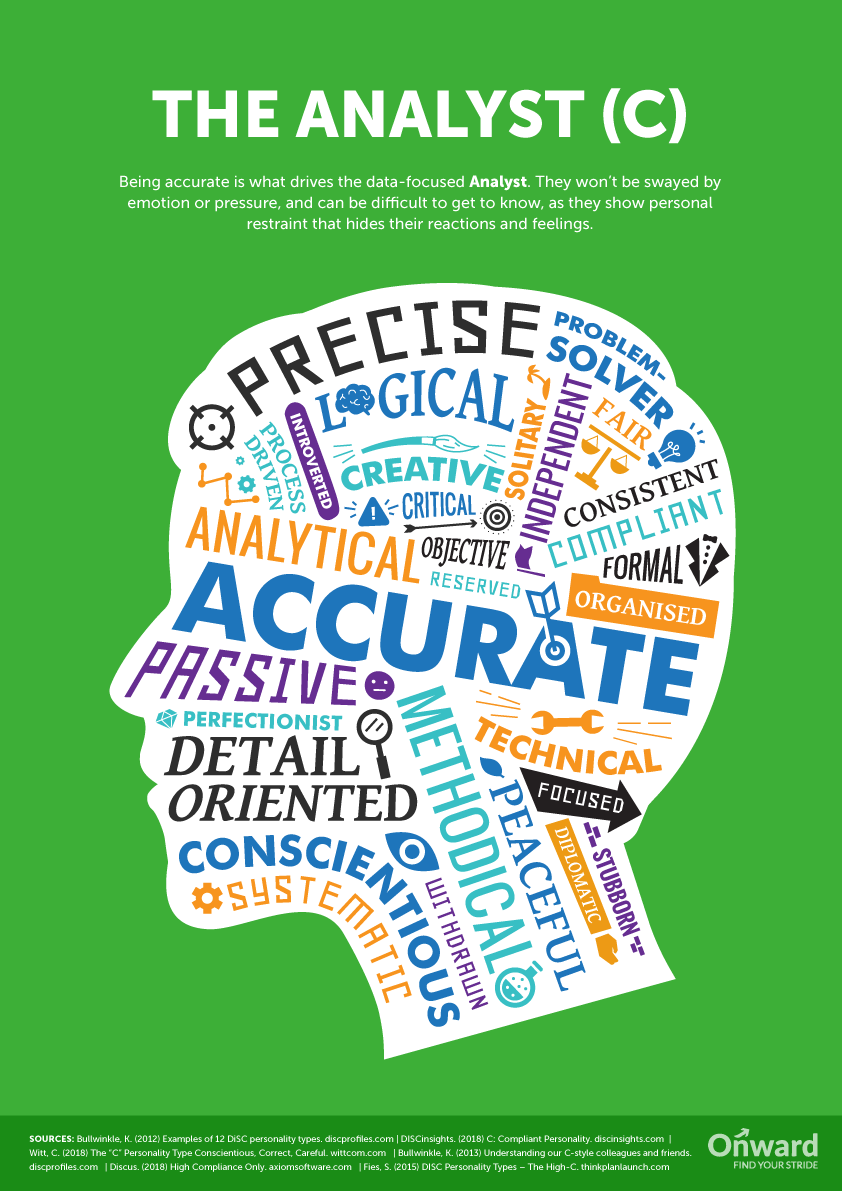
The Perfectionist (CD)
The Perfectionist is detail-oriented and assertive, a powerful combination but one that can be hard to live with! On the other hand, with a Perfectionist for a boss you will truly be driven to excel and will likely develop quickly in your role.
If you’re working with a Perfectionist, don’t be afraid to draw her attention back to the bigger picture by using clear language and logical arguments to re-prioritize the workflow.
As with each personality type, if this is you then you will benefit from figuring out the strengths of your colleagues, communicating openly, and valuing your time with the diverse workforce around you.
